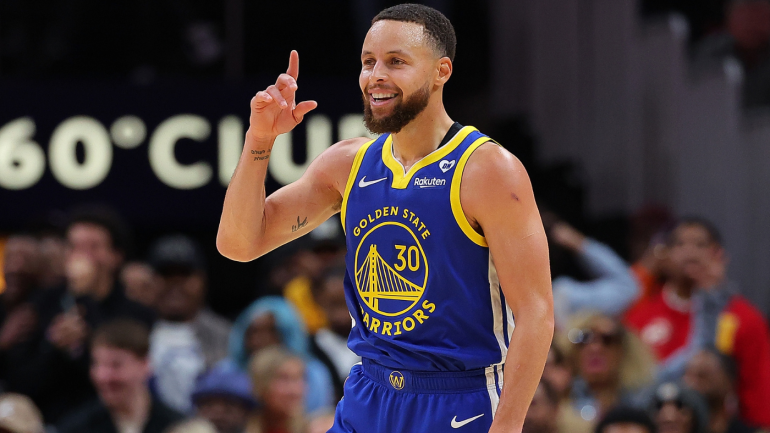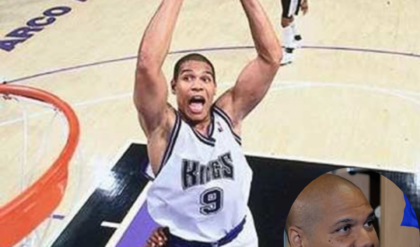The NBA’s Clutch Player of the Year is in just its second season of existence

Handicapping races for NBA awards like MVP and Defensive Player of the Year is usually a fairly straightforward process. We have decades of precedent. We’ve seen almost every sort of race those awards are capable of producing.
We’ve had the “best player vs. best team” arguments. We’ve more or less settled on acceptable volume thresholds. We’ve identified typical voter biases. It’s not an exact science, but we generally know what goes into picking those awards.
That’s what makes the Clutch Player of the Year race so much fun. We have only one year of precedent. Kings guard De’Aaron Fox won last season as the NBA’s leading clutch scorer, and his late-game heroics made an enormous difference in a conference in which his No. 3 seeded Kings won only five more games than the No. 7 seeded Lakers.
We’re figuring out what exactly this award is, and who wins over the next few years is going to go a long way in defining what it ultimately turns out to be. So let’s rank this year’s field, and in the process, hopefully get a better sense of where this award is going over the next few years
5. Damian Lillard, Bucks
Two months into the season, it looked like this award was Lillard’s to lose. On Christmas, the Bucks were 22-8, but 12-3 in clutch games. Lillard had more clutch points (78) than three entire teams, and his incredible buzzer-beater against the Kings gave him a signature moment.
In the early days of the Adrian Griffin era, Milwaukee’s formula for winning amid all of the chaos we would later learn surrounded that team was essentially “keep it close until the end when Dame can take care of the rest.” Milwaukee was so reliant on Lillard that, at that point in the season, he was scoring nearly 40% of the team’s clutch points.
But apparently January, February and March aren’t Dame Time. Lillard ranked 19th in the NBA with just 37 clutch points since Christmas, and the Bucks are down to 8-7 in clutch games in that window.
He’s shooting an unimpressive 40.7% from the field and 23.1% from 3-point range since then, so he’s more or less fallen out of the race. Those magical two months to start the season get him on the list, but this is a full-season award, and the calendar year of 2024 has knocked Lillard out of the running.
4. LeBron James, Lakers
We’re not going to hand out trophies based on a single game, but the fourth quarter of the Lakers’ Feb. 28 victory over the Clippers is instructive here. The Lakers made 12 field goals in the final 11 minutes and 10 seconds of that game. James made seven of them and assisted on four more of them.
He did that while defending Kawhi Leonard and holding him scoreless for roughly five-and-a-half minutes straight. The Lakers overcame a 21-point fouth-quarter deficit to win that game.
That’s what gets LeBron on the list here. The raw numbers don’t exactly stand out, and he’s only played in 23 clutch games thus far this season. But in do-or-die situations, there still isn’t a more versatile player than the 39-year-old James. He can’t do everything for 48 straight minutes anymore, but he can do anything the Lakers need for four or five.
In late-game settings, that optionality is incredibly valuable. If he needs to match buckets, he can do that. If Anthony Davis or D’Angelo Russell are hot? He can set them up. If he needs to lock up an opponent? He can still guard practically anyone for short stretches.
If your life was on the line and you needed to win one, single five-minute stretch, there are very, very few players you’d take over LeBron James.
3. DeMar DeRozan, Bulls
James and Lillard are largely here to round out the list. The real competition starts here. No team relies on what happens in the clutch more than the Bulls do. Chicago has 31 wins all season. That’s the 19th most in the NBA, but they have the most clutch wins in basketball with 22.
DeRozan was on the floor for 20 of them, and Chicago has won his clutch minutes overall by 72 points. That’s pretty notable considering they’ve lost literally all of their other minutes by 162 combined points.
The Bulls are a generally mediocre team that is probably going to sneak into the Play-In tournament because of DeRozan’s late-game heroics (and… well… the truly horrific bottom of the East.)
So what’s the case against DeRozan? Well, he’s got a teammate that might get some down-ballot consideration here. Coby White ranks 16th in the NBA with 80 total clutch points, and he leads the entire NBA with a clutch plus-minus (plus-91) while also leading the NBA in clutch assists (27). We’re not awarding duos here, and our front-runner is very much a solo act.
There’s also a broader conversation to be had about the meaning of the word “clutch.” We typically define “clutch” as the ability to succeed in the most important moments of the most important games, but does a team like Chicago, whose ambitions don’t really extend beyond the play-in, ever really play in important games?
We touched on the bottom of the Eastern Conference before. The 11th-place Nets are currently 26-39. Would Chicago’s status really materially change without DeRozan? Even if it did, would it matter?
Say what you will about the 2023-24 Golden State Warriors, but their goal coming into the season was a bit loftier than the play-in. They face significantly more pressure by virtue of their past performance. Shouldn’t “clutch” mean more to them than it does a team like the Bulls?
And in turn, wouldn’t it mean more for a team like Denver, that is at the top of the standings and in need of every possible win for seeding purposes? This is subjective, of course, but it’s worth monitoring. Fox won as a No. 3 seed last season. Will play-in players wind up factoring into these races long-term?
2. Nikola Jokic, Nuggets
Jokic is 40 points behind DeMar DeRozan in the clutch, and the gap to Stephen Curry is even wider. The Nuggets have the best clutch record of our three top candidates, but DeRozan has a better clutch plus-minus than Jokic. He has 17 clutch assists, an impressive number, but not overwhelmingly so. DeRozan has 14 and Curry has 11. Statistically, he’s a very clear No. 3.
But pretend for a moment that we didn’t have access to these numbers. If you polled 100 fans about what team they most trust in the clutch… an overwhelming majority would probably say the Nuggets, right? What team seems to most consistently get great shots late in games?
How many times have the Nuggets stolen a big game in the final moments and generated a “Jokic is inevitable” news cycle? As incredible as his late-game hook pass to Aaron Gordon against Boston was last week, he’s done something of that nature at least half a dozen times this season.
Jokic’s candidacy is for the “LeBron should win MVP every year” crowd. The numbers, either volume or efficiency, might not support it. But if we all agree that Jokic is the best clutch player, and we all agree that clutch sample sizes are too small in a single season to be especially meaningfully, isn’t it reasonable to lean on him when there’s any reasonable doubt about the candidates above him?
Jokic probably isn’t going to win this award, but we’re all probably going to feel silly about that in May and June when Curry and DeRozan are at home and Jokic is Jokic’ing the best teams in the league in the biggest games of the season.
1. Stephen Curry, Warriors
Making the case for Curry is easy. He’s the league leader in clutch points with 165. He’s made 28 3-pointers in the clutch. Forget about leading all players, that’s more than 21 teams. The previous full-season record for clutch 3-pointers was 22, shared by Mike James and Reggie Miller.
Curry is already six 3-pointers ahead of that mark with a month of basketball left to play. The Bulls might depend on clutch wins more than any other team, but the Warriors depend on Curry to generate their clutch wins more than any other team relies on any player. He’s scored nearly half of their 335 clutch points this season.
The case against Curry is more interesting, and it harkens back to many of the debates that past MVP races have generated. The Warriors are below .500 in clutch games at 18-20. Granted, Curry has missed four of those games (all of which were losses), but the general point still stands.
In theory, Curry has taken a team that should be quite bad in the clutch and made it average, but are we sure it would be that bad without him? That’s certainly a fair point to make during the games Chris Paul has missed, but when Paul is available, he is among the most reliable regular-season clutch shot-creators in NBA history.
As bad as Klay Thompson has looked at points this season, he’s still Klay Thompson. Jonathan Kuminga is one of the league’s best young players. Curry isn’t doing this for the Wizards.
We’ve seen MVPs come from less traditional backgrounds more often in recent years. Jokic and Russell Westbrook both won as No. 6 seeds. Curry’s individual case is unassailable, but will Clutch Player of the Year be held to the same standard that MVPs are? Can you win that award from a play-in spot?
Can you win it when your team loses more clutch games than it wins? We’ll have a much clearer idea after the season, because if this is solely an award about individual performance, Curry is going to win.
News
Van Ban Electricity: Ensuring effective exploitation of the distance meter system
As we approach the end of May 2024, Van Ban Electricity has made significant strides in modernizing its electricity management system. With a customer base of 26,135, the company has successfully implemented a long-distance electronic meter system, ensuring accurate and…
Good news for Vietnamese rice
The recent announcement by Mr. Arsenio Balisacan, Minister of Economy and National Development of the Philippines, regarding the reduction of import tax on rice has significant implications for both the Philippines and its trading partners, particularly Vietnam. This decision to…
A joint venture of 3 contractors won the bid for the new construction project of Bac Ha district administrative center
The Bac Ha District Construction Investment Project Management Board has recently announced the selection of the contractor for package No. 5 to construct works under the Bac Ha District Administrative Center Headquarters project. The new administrative center of Bac Ha…
The Nhon – Hanoi railway line is eligible to operate at the end of June
As planned, 10 trains of the pilot urban railway line in Hanoi, Nhon – Hanoi station section have just been granted a Certificate of quality, technical safety and environmental protection by the Vietnam Register. railway transport. Illustration photo: Trung Nguyen/News…
Promote investment promotion in the agricultural sector
On the morning of June 6, the Provincial Department of Agriculture and Rural Development organized a conference to promote investment in the agricultural sector in Lao Cai province. Conference scene. The conference was attended by leaders of the Department of…
Sa Pa has basically completed seasonal rice cultivation
Sa Pa town in Vietnam has laid out an ambitious plan for this year’s rice crop, aiming to cultivate 3,600 hectares with a variety of rice types. The town’s agricultural sector is taking advantage of favorable weather and abundant water…
End of content
No more pages to load











